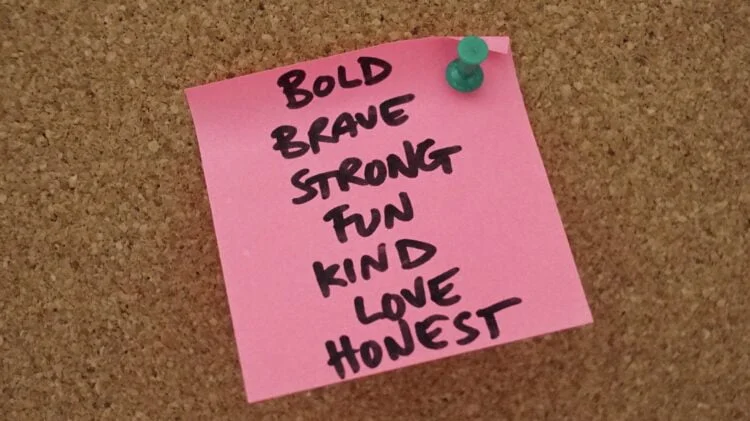
The value of val-yous: why reflecting on personal values can boost your colleagues confidence and sharpen decision making
Why reflecting on personal values can book your colleagues confidence and sharpen decision making.
Ever noticed someone dithering over a decision?
Not because they don’t care. Quite the opposite, they’re thinking hard, weighing it all up, tying themselves in knots… and still not quite sure what to do.
Maybe they said yes to something and instantly regretted it. Maybe they stayed quiet when they really had something to say.
These little wobbles, hesitation, overthinking, second-guessing are often a sign they’ve drifted from their personal values. Or more likely, they’ve never had the chance to pin them down.
And when that happens across a whole team? It’s not just the odd moment of indecision. It’s lots of people quietly asking themselves: Why am I doing this? Do I really believe in this direction? Is this the right call?
That fog slows everything down. It chips away at confidence. It makes brave thinking harder to come by.
Everyone needs a North Star. Something to steer by when the pressure’s on or the path ahead isn’t clear.
That’s where a simple values check-in can be transformative.
Research shows that writing about your values for just ten minutes has long-lasting effects. We’re talking months, even years later, better decision-making, more focus, stronger self-belief and improved social connection. (Thank you Kelly McGonigal for the evidence.)
When someone gets clear on what matters to them, they act with more certainty. They make faster, more grounded decisions. They stop twisting themselves in knots trying to please everyone or guessing what’s expected.
And the beauty of it? It doesn’t take much.
Just a quiet moment to reflect. A nudge to think about when they were at their best, what was present, what mattered. A bit of encouragement to name the values that drive them.
When people know who they are and what they stand for, they show up differently. They speak with more confidence. They stop dithering.
And that shift—tiny as it seems—can ripple through everything.
Listen to the podcast - The Value of Val-yous


Bit Famous works with businesses and organisations to help them communicate with confidence.
By Penny Haslam
MD and Founder - Bit Famous
FREE resources for leaders and people professionals from Penny Haslam and Bit Famous
Share this page
Where people professionals share the great work they do!

Personal val-yous? Yes, please
You’ve seen them. The values posters.
Words like integrity, innovation and teamwork beaming out from reception walls or tucked into a PowerPoint slide.
But here’s the thing, those aren’t your values. They’re organisational ones. And while they might be well-meaning, they don’t always tell you much about what really drives the people who work there.
So, when was the last time you asked someone, what do you stand for?
Not the company line. Not the stuff we’re meant to say. But their own personal beliefs. The ones that shape how they behave, how they lead, how they make decisions under pressure.
I call these your val-yous (spelled that way to remind us this is all about you).
They’re easy to overlook. We don’t get much time or permission to explore them. But when people do, even briefly, the difference is noticeable. Why? Because your values anchor you.
They act like a compass when things get complicated. They remind you who you are when the noise ramps up. They guide the way forward when the road forks.
And the bonus? They strengthen your relationships too. When people understand what they stand for, they tend to connect better with others. It builds trust, clarity and those all-important human bonds that make teams tick.
So how do you bring this into the workplace? Let’s break it down.
1. Start with yourself
Before you ask anyone else to reflect on their val-yous, try it yourself. Try this: write down 15 to 20 values that resonate with you. Don’t overthink it. Just jot what comes to mind, honesty, humour, fairness, ambition, calm, courage, whatever feels like you. (There's a big list of values at the bottom of this blog).
Then take a step back. Ask yourself:
- Which ones are non-negotiable?
- Which ones guided your best moments?
- What was missing at your lowest points?
Here’s another good test, what gets under your skin?
If someone’s behaviour really winds you up, there’s a good chance it clashes with one of your values. That feeling of irritation can be surprisingly revealing.
Now whittle that list down to a shortlist of five or six. The ones that make you nod and go, Yes, that’s me.
Stick them on a Post-it. The front of your notebook. A note on your phone. Somewhere you’ll see them.
It’s a small act but a powerful one.
Because the more often you’re reminded of what matters to you, the easier it becomes to lead in a way that’s consistent, grounded and clear. You stop reaching for generic advice or second-guessing your instincts. You start backing yourself.
And once you’ve done it for yourself, you’ll see exactly why it’s worth encouraging others to do the same.
2. Encourage your team to explore their val-yous
Once you’ve done the work yourself, create space for others to do the same. You don’t need a special workshop for this (although it's part of the confidence workshop sessions I run). Just build it into a regular team moment:
- A check-in question in a one-to-one: What’s been important to you this month?
- A reflective pause during a team meeting: When were you at your best recently, and what values were present?
- Or a quiet prompt: Write about what motivates you, what makes you proud and who inspires you.
This isn’t fluff. It’s clarity.
When someone understands what they stand for, they stop circling decisions or hiding behind “I’m not sure.” They start showing up. They speak more directly. They stop waiting for permission to be themselves.
That’s when the shift happens, from hesitation to action, from vague to focused, from passive to purposeful.
And across a team, those small shifts add up to something powerful. You get stronger collaboration. Faster decisions. Fewer “What are we even doing here?” conversations.
You get people leaning into their strengths, not shying away from them.
So ask the question. Build the habit. You’ll be surprised what it unlocks.
3. Use val-yous to spot strengths
When you know someone’s values, you start to see what makes them shine, not just what they do, but how they do it.
Think about the quietly dependable team member who always follows through. That might be a deep value of responsibility or integrity. Or the one who brings calm in the middle of chaos, that could be composure, clarity, or care.
These are strengths hiding in plain sight.
Once you start noticing values in action, your feedback becomes far more meaningful. It’s not just “well done”—it’s “well done because…”
One leader I worked with started doing exactly this. Instead of generic praise, she’d name the value she saw:
“You handled that brilliantly and it really shows your commitment to fairness. That’s something you bring to every project.”
Simple, right? But it landed with her team. Because when you connect performance to a person’s internal compass, it doesn’t just feel good, it feels true.
And when people feel seen like that, they’re more likely to keep showing up in exactly the way you want. It’s a win-win.
So next time you recognise someone, try going a step further. Spot the val-you behind the strength and say it out loud.
Why it matters
Tricky moments are part of the job. Tight deadlines. Sudden changes. Awkward conflicts. Uncertainty crops up whether you’re ready for it or not.
And when it does, people often freeze.
They overthink. They hesitate. They try to please everyone or play it safe just in case.
But when someone’s clear on their val-yous, they don’t spiral. They don’t flounder. They navigate.
Because values act like an internal compass. When things get messy or uncertain, they give people something solid to steer by.
That means quicker decisions, less dithering, and a stronger sense of personal responsibility. Not because someone’s told them what to do—but because they already know what they stand for.
And in teams where this kind of clarity is encouraged, you see the difference. People are more present. More connected. More confident in their choices and in each other.
They’re not just reacting they’re responding. With purpose.
So yes, it’s a simple practice. Just ten minutes of reflection. But the ripple effect? That can be huge.
Because when people feel anchored in what matters to them, they don’t just do their jobs, they thrive.
Need inspiration? Here's a list of personal values start from
Here’s a list of values grouped by theme. Use it as a pick-and-mix. There are no right answers, only the ones that speak to you.
Achievement & accomplishment
Abundance, Achievement, Challenge, Determination, Growth, Mastery, Success, Wealth
Creativity & curiosity
Adventure, Creativity, Curiosity, Exploration, Innovation, Originality
Enthusiasm & enjoyment
Fun, Excitement, Joy, Playfulness, Surprise
Feelings & mindset
Compassion, Empathy, Gratitude, Happiness, Kindness, Love, Positivity, Respect
Health & energy
Fitness, Health, Vitality, Energy
Independence & freedom
Freedom, Individuality, Self-reliance
Integrity & principle
Authenticity, Fairness, Honesty, Integrity, Responsibility, Trustworthiness
Knowledge & intelligence
Learning, Logic, Wisdom, Insight, Foresight, Brilliance
Order & stability
Consistency, Organisation, Security, Stability, Structure, Timeliness
Presence & mindfulness
Calmness, Clarity, Focus, Simplicity, Tranquility
Skillfulness & competence
Excellence, Hard work, Motivation, Professionalism, Quality, Self-development
Spirituality & harmony
Balance, Faith, Forgiveness, Harmony, Peace, Purpose
Strength & courage
Ambition, Assertiveness, Bravery, Confidence, Courage, Dedication, Resilience
Togetherness & unity
Charity, Community, Equality, Family, Friendship, Loyalty, Teamwork, Support












